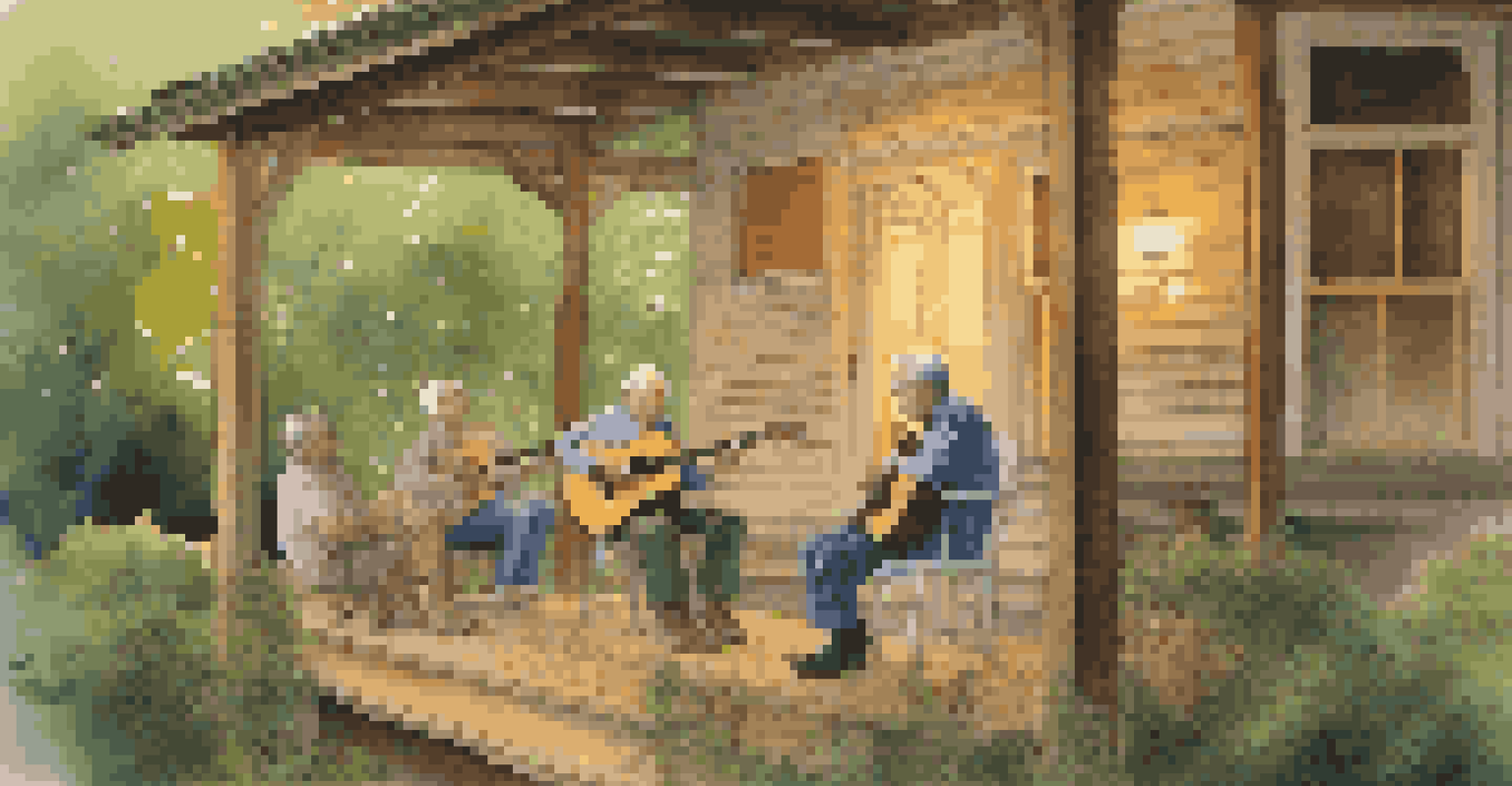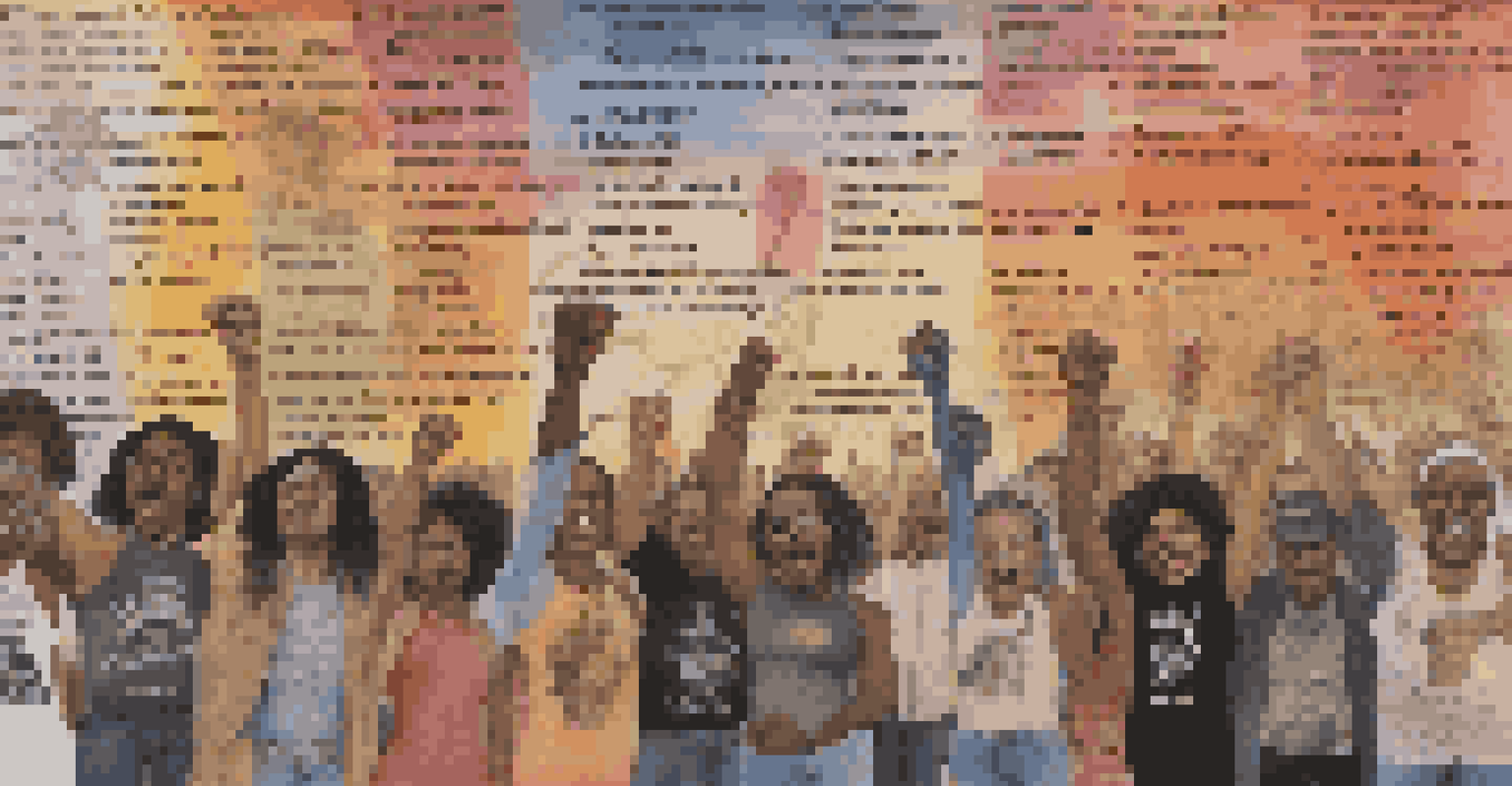The Role of Music in Shaping Historical Narratives and Memories

Music as a Reflection of Cultural Identity and Values
Music often serves as a mirror reflecting the cultural identity of a society. From folk songs to modern anthems, these melodies encapsulate the values, struggles, and aspirations of a community. For instance, the Civil Rights Movement in the United States was profoundly influenced by songs like 'We Shall Overcome,' which not only inspired activists but also articulated their collective experiences.
Music can change the world because it can change people.
Moreover, music can act as a unifying force, bringing people together around shared stories and emotions. In many cultures, traditional songs are passed down through generations, preserving historical narratives that might otherwise be forgotten. Think of how Irish folk music tells tales of emigration and hardship, allowing listeners to connect with their ancestry.
Ultimately, music becomes a living document of a culture's history, shaping how individuals understand their past. This connection fosters a sense of belonging and pride, reinforcing the idea that history isn't just something we study; it's something we feel and experience through sound.
Songs as Historical Narratives: Telling Stories Through Lyrics
Lyrics often serve as powerful storytelling tools, capturing moments in history and personal experiences. Songs like 'Imagine' by John Lennon challenge listeners to envision a world free from conflict, while 'Fortunate Son' by Creedence Clearwater Revival critiques the Vietnam War. These narratives resonate with listeners, making complex historical events more relatable and impactful.

Through vivid imagery and emotional depth, songwriters can encapsulate the essence of an era. For example, Bob Dylan's 'The Times They Are A-Changin'' became an anthem for social change in the 1960s, urging listeners to embrace the evolving landscape of American society. Such songs not only document the zeitgeist but also influence it, encouraging action and reflection.
Music Reflects Cultural Identity
Music serves as a mirror of society, encapsulating its values, struggles, and aspirations through powerful melodies and lyrics.
Thus, music acts as both a historical record and a catalyst for change. By encapsulating narratives in song, artists help ensure that stories of struggle, triumph, and resilience are remembered and celebrated.
The Emotional Power of Music in Memory Formation
Have you ever heard a song and been transported back to a specific moment in your life? This emotional connection underscores the powerful role music plays in memory formation. Research suggests that music activates the brain's reward and emotional centers, making it easier to recall memories associated with particular songs.
Without music, life would be a mistake.
For instance, many people associate love songs with significant relationships or life events, enhancing their emotional resonance. This phenomenon also extends to national anthems, which can evoke feelings of pride and nostalgia among citizens. When a nation faces challenges, these songs can reignite shared memories of resilience and unity.
Essentially, music becomes a soundtrack to our lives, intertwining personal memories with broader historical narratives. It not only helps us remember but also shapes how we perceive our past, creating a rich tapestry of experiences that resonate across generations.
Music in Social Movements: A Tool for Change and Solidarity
Throughout history, music has played a pivotal role in social movements, serving as a rallying cry for change and solidarity. From the anthems of the labor movement to the protest songs of the 1960s, musicians have used their platforms to amplify voices and inspire action. Songs like 'A Change Is Gonna Come' by Sam Cooke became synonymous with the fight for civil rights, capturing the spirit of an era.
Moreover, music fosters a sense of community among activists, creating bonds through shared experiences and emotions. When people sing together at rallies or protests, they cultivate a collective identity and strengthen their resolve. This communal aspect of music can be incredibly empowering, reinforcing the idea that individuals are part of a larger movement.
Songs as Historical Narratives
Lyrics act as storytelling tools, capturing significant moments in history and personal experiences, making complex events relatable.
As a result, music not only documents social struggles but actively participates in shaping their outcomes. It reminds us that the fight for justice and equality is woven into the very fabric of our cultural heritage.
The Role of Music in Preserving Cultural Heritage
Music serves as a vital tool for preserving cultural heritage, especially in communities where oral traditions are paramount. Traditional songs often carry stories, legends, and historical knowledge, ensuring that these narratives are handed down through generations. For example, Indigenous music in various cultures encapsulates the history and spirituality of a people, fostering a sense of continuity and connection.
In addition, festivals and cultural events often feature music as a core component, allowing communities to celebrate their history and identity. These gatherings create opportunities for younger generations to engage with their cultural roots, reinforcing pride in their heritage. Think about how the rhythms and melodies of Afro-Brazilian music play a crucial role in Carnival, celebrating both history and community spirit.
Ultimately, music acts as a bridge between the past and present, allowing cultures to evolve while still honoring their origins. By preserving these musical traditions, communities ensure that their histories and identities remain vibrant and relevant.
Globalization and the Evolution of Musical Narratives
In our interconnected world, globalization has significantly influenced the evolution of musical narratives. As cultures blend and interact, new genres and styles emerge, often incorporating elements from various traditions. For instance, the rise of world music has introduced audiences to diverse sounds and stories, broadening our understanding of global history.
However, this fusion can also lead to cultural appropriation, where elements of one culture are used without proper understanding or respect. This highlights the importance of recognizing and honoring the origins of musical styles while appreciating their evolution. An example is the way hip-hop has transcended its roots in African American communities to become a global phenomenon, reflecting both cultural exchange and appropriation.
Music's Role in Social Movements
Throughout history, music has unified communities and amplified voices in social movements, acting as a rallying cry for change and solidarity.
Thus, while globalization enriches musical narratives, it also presents challenges in how we understand and respect cultural heritage. Navigating these complexities allows us to appreciate the depth and diversity of music as a powerful historical narrative.
The Future of Music in Shaping Historical Narratives
As we move forward, the role of music in shaping historical narratives will continue to evolve. With advancements in technology, artists can now reach global audiences instantly, enabling stories to spread rapidly and resonate widely. Platforms like social media allow for real-time engagement, making music a dynamic force in contemporary storytelling.
Emerging genres and collaborations are also expanding the boundaries of musical expression, reflecting the complexities of modern life. For instance, the rise of digital artists and producers is reshaping how we experience music and its narratives. As these new voices emerge, they contribute fresh perspectives to historical and social themes, ensuring that music remains relevant.

In essence, the future of music holds immense potential for deepening our understanding of history and identity. By continuing to explore and innovate, musicians will play a crucial role in documenting and shaping the narratives of tomorrow.